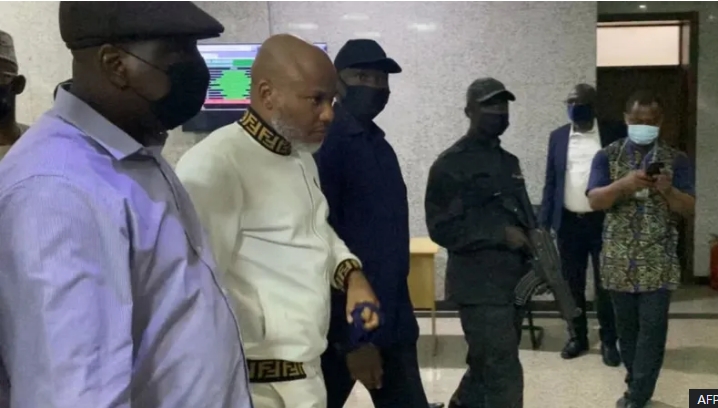
Abuja – A federal high court in Nigeria’s Abuja has dismissed a suit filed by Nnamdi Kanu, the illegally detained leader of the Indigenous People of Biafra (IPOB), against the federal government and Department of State Services (DSS).
In a verdict passed on Monday, the presiding judge, James Omotosho held that Kanu failed to provide credible evidence to back the allegation of violation of his fundamental rights by the defendants.
Justice Omotosho said claims that operatives of the DSS denied Kanu access to his lawyers, and that the officials eavesdropped on his conversations with his lawyers, could not be established.
The suit was marked FHC/ABJ/CS/1633/2023 and filed on December 4, 2023.
Kanu joined the Federal Republic of Nigeria, attorney-general of the federation (AGF), DSS and its director-general as 1st to 4th respondents respectively.
The self determination activist sought “a declaration that the respondents’ act of forcible seizure and photocopying of confidential legal documents pertaining to facilitating the preparation of his defence, which were brought to him at the respondents’ detention facility by his lawyers, amounted to denial of his rights to be defended by legal practitioners of his own choice”.
He also sought a declaration that the respondents’ act of preventing his counsel from taking notes of details of counsel’s professional discussions/consultations with him at the DSS detention facility was unlawful.
Kanu further sought a declaration that the respondents’ act of eavesdropping on his confidential consultations/conversations with his lawyers amounted to denial of his rights.
Consequently, the detained activist prayed the court for an injunction restraining and prohibiting the respondents from their act of forcible seizure and photocopying of confidential legal documents brought to him at the detention facility by his lawyers.
He also sought N1 billion as damages for the mental, emotional, psychological and other damages he suffered as a result of the violation of his rights.
However, the DSS denied all the allegations by the applicant.
The secret police said the applicant is allowed access to members of his family and team of lawyers on his visiting days.
DSS averred that Kanu interacts and consults with his lawyers on his visiting days without any interference.
“Applicant’s counsel are allowed to moderate size notes or pads for the visit, but exchange of materials that promotes the IPOB ideals (subject matter of applicant’s criminal trial) were strongly resisted and refused,” DSS affidavit reads.
The FRN and the AGF, in their counter affidavit, also urged the court to dismiss the suit for being “an abuse of court process”.
Mr Kanu’s initial arrest in 2015 triggered protests by his supporters.
In 2017, Justice Binta Nyako of a Federal High Court in Abuja granted Kanu bail.
Upon his release, a military invasion of his ancestral home in Umuahia, Abia State, in September 2017, forced into exile, hence he did not attend his trial on the next scheduled date and thereafter.
From then till June 2021 when he was abducted from Kenya and was subjected to “extraordinary rendition”, and brought back to Nigeria, there has been a robust public debate as to whether he jumped bail or not.
But, the Appeal Court had discharged and acquitted Kanu of all terrorism charges. This judgment was later overturned by the Supreme Court which transferred the case back to the Federal High Court.
Kanu’s attorney, Aloy Ejimakor, in January, clarified that the Supreme Court had settled the controversy on whether Kanu jumped bail or not.
The attorney said the Supreme Court also clarified that Kanu’s bail “should not have been revoked”.
In the Certified True Copy (CTC) of the judgment delivered in December 2023, the apex court declared that Kanu did not jump bail.
IPOB wants a group of states in the south-east of Nigeria, which mostly comprises the Igbo ethnic group, to break away from the country and form an independent nation called Biafra.
In 1967 Igbo leaders declared independence for the state of Biafra, but after a civil war, which led to the deaths of millions of people, the self-determination movement was defeated.
But the idea of Biafra has never gone away and despite arrests of his members, Mr Kanu’s movement has seen a recent swell in its numbers.
KOIKI Media bringing the world 🌎 closer to your door step
